It’s never too late to prepare an emergency food supply even if you haven’t started yet. Read on to learn just how easy and simple it is.
Sometimes nature (or pandemics) may decide to throw its tantrums and crush you unexpectedly. While some people manage to survive, others get overwhelmed. The only difference between your chances of surviving and getting overpowered is how you prepare yourself.
While you can’t predict when disasters are bound to happen, you can plan ahead of time so that you don’t get crushed. Keep reading to learn the tricks of surviving any emergency without getting overwhelmed. But before we focus on how to prepare your emergency food supply, here is what to factor in.
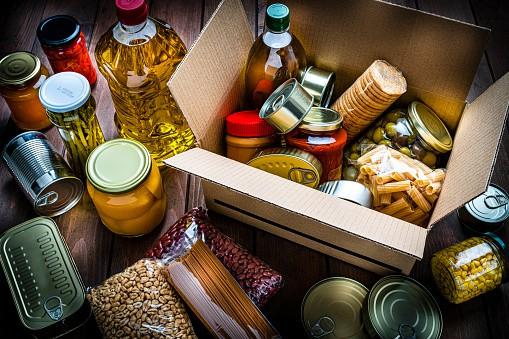
What is Emergency Food Supply?
Emergency food is a supply of food stored in cases of dire need and emergency. Disasters occur every day in our world without warning and you and your family could be cut from any food sources. This is why it is important to keep emergency food stored at your residence.
Emergency food is usually in dry form or can, however, it can also be in plant form in your garden. Longer shelf life foods are best for these situations.
What To Factor In When Choosing Emergency Food Supplies?
Some factors to consider while choosing emergency food kits include:
1. Size Of Your Family
You don’t want to run out of supply early or skip meals to adjust to the available food. You need to do your math well and factor in the size of your family in regards to daily food consumption. In case you have kids, you can’t miss including food for your young ones. If you also have pets, you have to make sure they get well-nourished even during a low food supply.
2. Personal Preferences
Just because you are from one family doesn’t mean you all love enjoying the same meals. Everybody may have different food preferences which need to be factored out. When budgeting, consider your family member’s food preferences and throw in a few treats. In case you have members of the family who need dietary requirements or supplements, they should be factored in.
3. Shelf Life
Different foods will vary in regards to their shelf life. Though some foods are fit for consumption even after their expiry dates, this shouldn’t be a reason enough to ignore their shelf life.
Note that the nutritional content for some foods will reduce after the expiry date, which means your body will be supplied with lesser calories. Worse still; you may be required to consume more to keep your body nourished, which means increased consumption. High consumption will eventually affect your food projection period. So, the point here is to get foods with a long shelf life as possible.
But remember some foods like canned fruits will have a lesser shelf life. So, you have to make sure you store them at the right temperature to keep them fresh.
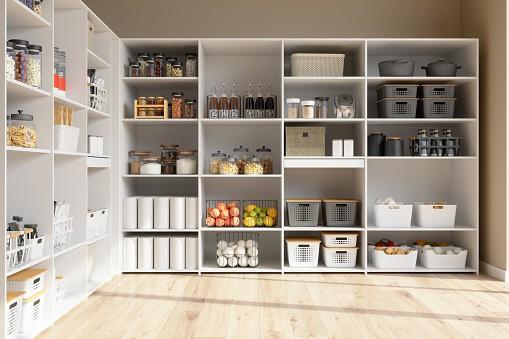
4. Cost
Food inflation rates keep on changing day in day out. And while relevant authorities claim to keep these prices in control, some stores will offer you better deals. Do your research well and make sure you go for affordable prices. This will enable you to shop more for less.
Cheaper alternatives aren’t always the nasty ones. I prefer to buy my food at lower-cost grocery stores as I do find some are better quality and definitely last longer.
5. Available Storage Space
It doesn’t make sense to invest much in food only to realize that you do not have enough space to store it. Make sure your storage can accommodate your food without overwhelming the place.
Now that you know what to factor in when planning for your emergency food supply here is what to pay attention to.
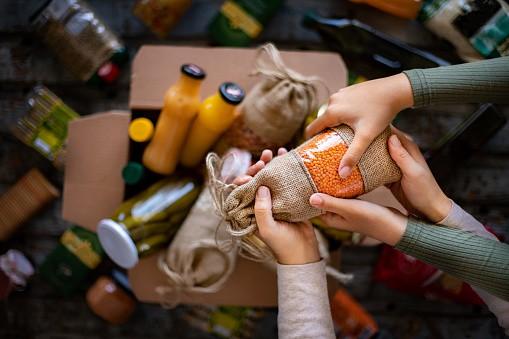
6. Water Supply
Water is vital in any emergency situation. Our bodies comprise 80% water, and you cannot afford to survive without it. If you are planning for drought, you need to invest in quality water storage tanks. To avoid costly water bills, you can harvest water during the rainy season.
For natural disaster displacement, you need to source water from nearby streams, lakes, and dams. However, while your body needs water to function correctly, you should not drink contaminated water.
Learning water purification hacks can help you keep yourself dehydrated. In case you do not have access to water purification supplies, boiling your water will help kill germs.
7. Canned Food
During an emergency, you may not have power, or you may suffer outages, which may affect your food. Canned food comes in handy during such times. Getting long-shelf emergency food is one of the best ways to survive any emergency. Remember to always choose lower acidic foods as these have a longer shelf-life than the higher acidity counterparts.
Aside from canned foods, here are some of the emergency foods you should consider.
- Ready to eat food like MREs
- Processed food
- Long shelf dried foods like pemmican, dried meals
- Oats as they taste great
- Rice
- Dried Pasta
- Hardtack
- Flour (Keep dry in a sealed container)
- Dried Lentils and Legumes
- Dry corn, rye, and barley
- Freeze-dried meats
- Powdered eggs
- Powdered milk
- Dried herbs
- Freeze-dried food like coffee
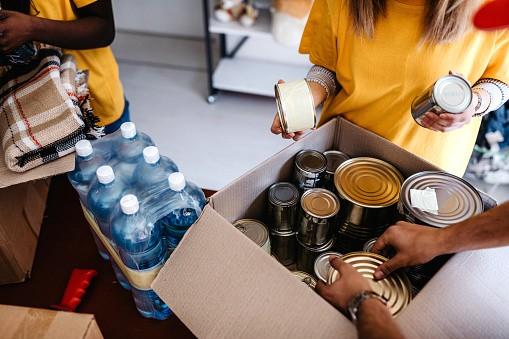
Emergency Food Equipment You Should Never Miss In Your Checklist
- Food thermometer
- Can opener( manual)
- Utensils and disinfectants
- Sanitary and cleaning equipment
- Dehydrator
- Ziplock freezer bags
How To Store Your Emergency Food Supply?
Now that you have enough food supply which can last you for years without any need to freeze them, the next thing you should figure out is how to store them. Different foods will react differently, depending on temperature levels. Keeping these temperatures in control will help you keep your food safe for a long.
Make sure you store all your food in a cool, dry place. You may need to stack several cartons to save on space but be vigilant not to overstack them. Piling more than the recommended number will put excessive pressure on the cans or food and may burst, bend, or get damaged, exposing food to bacteria.
You can purchase cheap DIY shelving to store your shelf foods on. Either in your garage, spare room or shed. Just remember to keep up with your pest control as rats and mice can also take advantage of your food.
Keep your store temperatures in check to ensure your food is not exposed to high temperatures.
How To Avoid Spoilage Of Your Food Supply?
Store your food out of direct sunlight. Keep the temperature moisture/humidity stable and low if possible. Certain moths and insects will breed in wheat products so remember to keep them sealed tight. Keep those rodents out, they will chew through just about anything.
It’s essential for the long-term storage of different dishes like meat and other stock.
Rotate your food supply on a regular basis and be sure to use up any food going out of date. If it is out of date be sure to read this before you throw it out How Long is Canned Food Good for After Expiration Date.
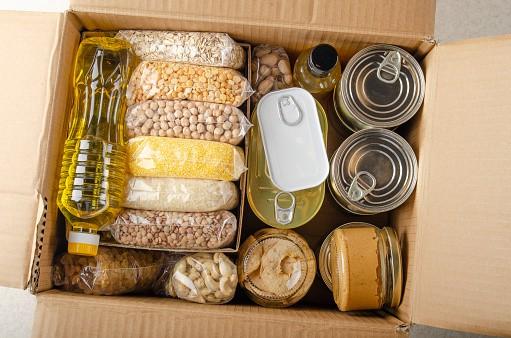
What To Do When The Power Goes Out?
First off, if the power goes out use up your perishables first from the fridge where practical. If your freezer seal is airtight you should get at least 12-24 hours before that food spoils depending on the weather temperature outside.
When it comes to cooking or heating food you may have to resort to a camp oven or stove outdoor ONLY.
Have A Variety Of Food Supply For The Whole Family
When emergencies strike it’s important to keep the family in high spirits especially kids. Having some treats like hard candy on the shelf could help lift the morale of everyone during those gloomy times. A couple of jars of rock candy or packets of starburst will last a long time on the shelf. You won’t need long-term food storage for your favorite meals.
How To Handle Emergency Food In Case Of Floods?
Sometimes you may be caught unaware even when you thought you had made great plans. Flood water carries bacteria and other contamination, which can be a threat if they come into contact with your food. Keep yourself informed of the prevailing weather conditions to avoid getting caught unaware.
Place your food on higher ground or shift them to a safer place. Dispose of any homemade canned food, foods wrapped with foil, and any other food item that may have come into contact with floodwater.
Clean and sanitize any commercially canned foods that may have come into contact with water. Remove any loose labels and label your cans again to avoid confusion.
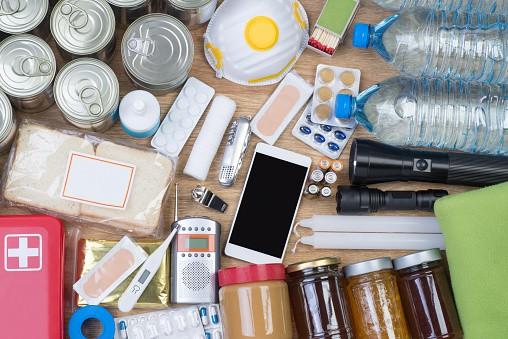
How To Handle Your Emergency Food In Case Of Fire?
Fire will expose your canned food to extreme temperatures, which will trigger bacterial growth. Also, toxic fumes produced in the event of a fire can also contaminate any permeable packages in the room. Any food in permeable packaging or that has been exposed to flames should be trashed.
When fighting a fire, some food packages may be exposed to chemicals. Any food packed in a permeable container that would have accidentally come into contact with fire-fighting chemicals should not be consumed. But for the commercially canned food, you can sanitize them with chlorine just like in the case of floodwater.
Tips For Surviving Any Emergency Situation
Some tips for emergency preparedness and surviving with emergency supplies include:
1. Plan Ahead
The fact that you have enough food supply in the store doesn’t mean you should sit band and relax. Plan ahead of time and don’t get caught unaware. Save money slowly, just in case your food goes bad or gets destroyed by natural disasters.
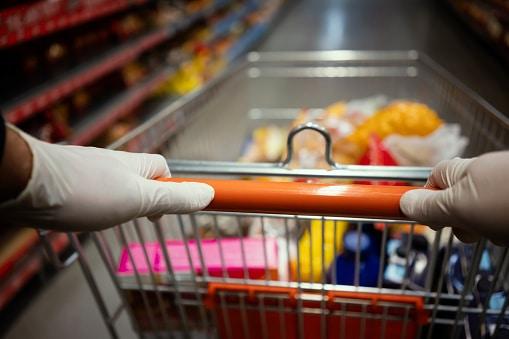
2. Be Calm
When a disaster strikes, try as much as possible to stay calm and handle the situation accordingly. You may have lost property or your food supply, but if you had saved money, you should be able to pick up the pieces and move on with life. This could be a lot to take in, but you have to stay positive and not panic.
3. Too Much Is Never Enough
Never stop preparing your emergency meals. You should always be rotating and stocking up whenever possible. Keep an eye out for bargains and discounts. If you run out of room you can always start using up the older supplies. From what we have seen during the COVID-19 pandemic you can never have enough food or supplies for that matter.
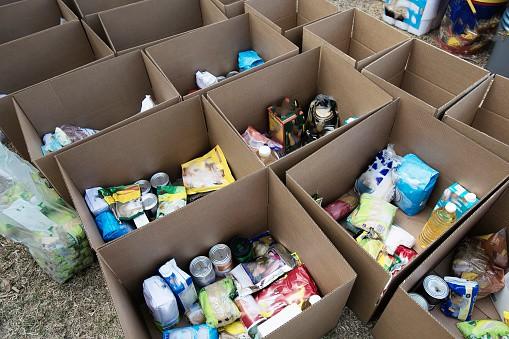
Wrapping up
Preparing your emergency food supply is one of the great moves you can make. This ensures that your family does not suffer when the unexpected strikes and becomes the next statistic.
Feel free to share your emergency food tips that worked for you.
